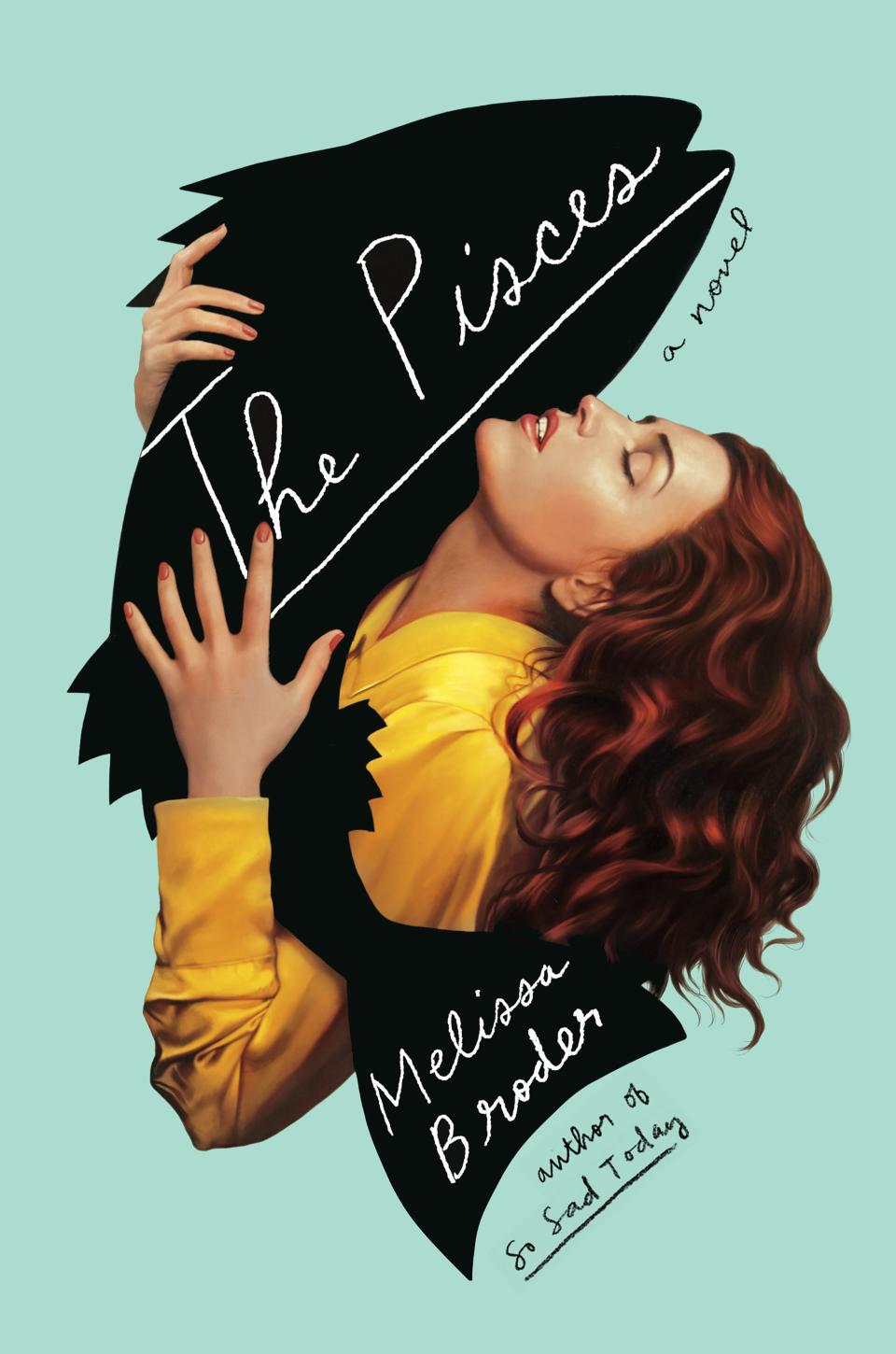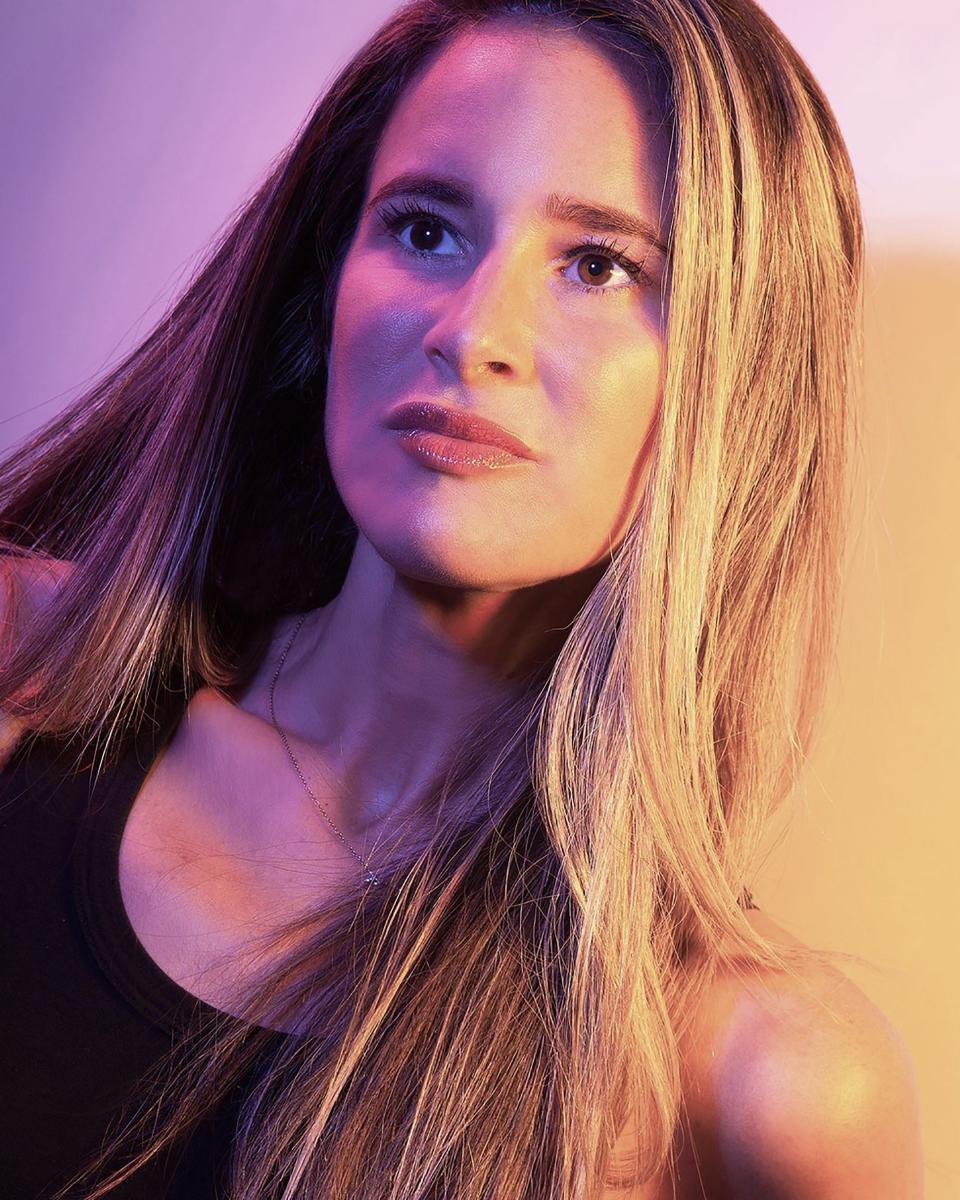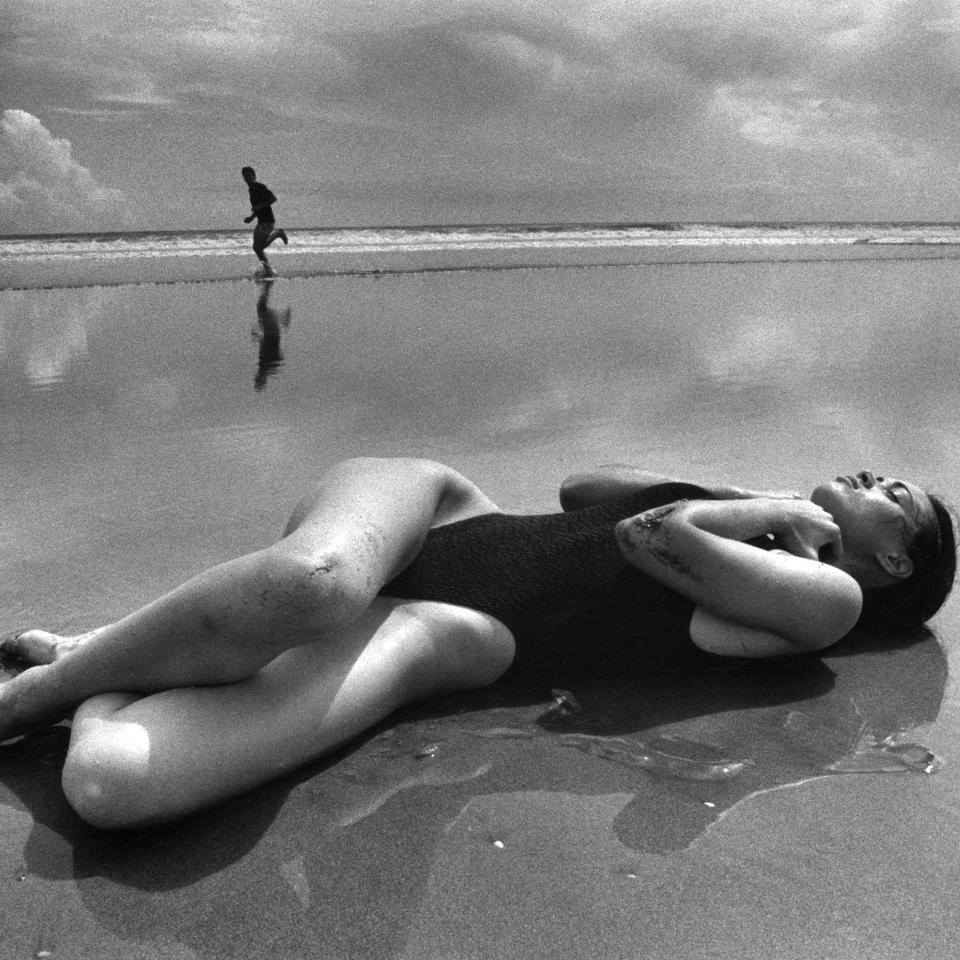In Melissa Broder’s The Pisces , a Darkly Erotic Love Story Between a Woman and a Merman
In her debut essay collection, 2016's So Sad Today, the poet and twitter personality Melissa Broder wrote about her open marriage, and an extramarital relationship she conducted over the course of more than a year with an intense, non-committal younger man who lived in another city. It began as a 21st century epistolary romance: first via DMs, then as a series of sexts, trading back and forth fantasies that escalated from the purely pornographic to the hilariously absurd ("I want to go deep in your Twitter feed and fave an unfaved tweet...") to the absurdly metaphysical.
Since So Sad Today, Broder has published a book of poetry—Last Sext (perhaps you're noting a theme)—and now her first novel, The Pisces, which is a little like one of those tweet-length flights of fancy spun out into book-length form. It's also the dirtiest, most bizarre, most original work of fiction I've read in recent memory. Lucy, in her early forties, is a grad student at a b-list university in Phoenix—nine years deep into a listless doctoral thesis on Sappho ("Accentual Gaps: Sappho's Spaces as Essence")—whose long-term relationship with an emotionally unavailable documentary filmmaker has just sputtered to an unceremonious stop. Suddenly single, deeply depressed, Lucy jumps at her wealthy older sister's offer to spend the summer dog-sitting in her empty, lavish Venice Beach pad. But rest, relaxation and police-mandated group therapy (this after a mildly violent altercation with the ex) quickly fall by the wayside when Lucy embarks on a Tinder-fueled sexual rumspringa and then, while on a beach walk one night, meets a mystery man bobbing around in the ocean. Theo is young, preternaturally sexy, and strangely nocturnal in his swimming habits. The reason eventually becomes apparent: he is a merman. Shortly after letting Lucy in on his secret, he's treating her to mind-blowing orgasms on the jetty that connects his oceanic world to her land-bound one. And it only gets weirder from there (suffice to say, I read The Pisces on an airplane and blushed hard enough that I'm fairly certain the stranger in the aisle seat noticed).

Broder has a talent for distilling graphic sexual thoughts, humor, female neuroses and the rawest kind of emotion into a sort of delightfully nihilistic, anxiety-driven amuse bouche (before she outed herself ahead of the publication of her essay collection, she was a book publicist who anonymously tweeted her against-the-grain tao under the pseudonym @sosadtoday, to the delight of celebrity fans like Katy Perry and Miley Cyrus. Sample tweet: "compulsive self-analysis that leads nowhere is my jam.") The Pisces is proof that she can sustain this 140 character knack over hundreds of pages and a narrative arch. It's a very funny farce of a book about the kind of love that really can't last, about the way a person, deeply in touch with her own sexuality and deeply aware of her own issues, can still allow herself to be sucker punched in her psychological blind spots. It's about the metamorphosing power of addiction—Broder has written about her struggles with alcoholism—how the thing that seems like the solution can really be the problem in disguise. Having read Broder's essay collection and novel in close succession, it's easy to graft plot points from the former onto the latter (the real life relationship of Broder's that Lucy and Theo's recalled for me grew so problematically intense that Broder cut off communication, admitted everything to her husband, and recommitted herself to monogamy).
But Lucy isn't the author: she's a Pisces, for one ("prone to a little bit of leakiness"); Broder, who writes a horoscope column for Lenny Letter, is a Virgo ("into making order out of chaos"). This novel is both of this world and not. Broder finds the surreal in the carnal (in this way, her book reminds me a bit of Miranda July's My First Bad Man), and the mundane in the extra-terrestrial. Mer/human relationships have been a literary preoccupation since literature's earliest days (Homer, sirens, etc.). Here the traditional equation—mermaid holding a helpless, doomed man in her thrall—gets turned on its head, and into a kind of a therapist couch breakthrough.
Broder finds something both resonant and amusing in our cultural attraction to these kinds of ultra-romantic death-wishes. "What's the greatest western love story?" she prompts, video chatting with me from her home in Los Angeles, where she's working on a screenplay adaptation of her novel for Lionsgate. "The template is Romeo and Juliet. They die for each other. They are forever in youth. These are not good things to aspire to. Our therapists would be like: bitch put down the phone. Walk away." Theo's mer-ness is just another of love's many toxic booby traps. His and Lucy's structurally impossible union (habitat-wise, not anatomically: he explicitly has a tail that begins south of his genitals) reflects other more familiar impossibilities: that, for example, of sustaining the heady, intoxicating exhilaration of early infatuation, of lingering too long, as Broder puts it, "in that desire for annihilation in a moment."
It's the question that obsesses her: "Why can't a moment last forever?" she asks, flipping her long, straight, highlighted hair and snapping the nicorette gum she chews at all times. (Her looks are borderline mermaid-ly, an edgier Daryl Hannah in Splash, but her vibe—funny, confessional, nasal—is entirely earthy.) We discussed her fascination with "fantasy love" versus "responsibility love," why she began writing fiction, and why she made Theo a merman (for the record: not even in the "top five mythological creatures I would get with." That list includes the Krakken, vomiting Cronus, and Apollo."Such a twink. Totally my type.")

Let me start by asking: what's your astrological chart?
I'm a Virgo. Scorpio moon, Sagittarius rising. So my relationship to astrology: when I was 19 I went through a break-up similar to Lucy's. I was stoned all the time and like, very deep in the fake cheese product. I got really into astrology because I wanted to be able to control the universe and bring love back to me or whatever. And since then I've given up on astrology. I'm like, it's bullshit. But it's kind of like if someone's a lapsed Catholic, and they still believe in hell even if they're like, fuck the religion? I still won't have sex with an Aries, you know what I'm saying?
Give Lucy a reading.
The Pisces is actually the 180 of Virgo. A Pisces really knows how to enjoy that TV show, eat dinner in bed. Lucy's pretty heady for a Pisces. Virgo's sort of the opposite, always thinking about everything. I also thought of it more in terms of a literary device: it was like, how perfect? The Pisces are two fish. It's this play on: am I a whole person? Can I be a whole person on my own? Can someone else complete me? I don't think we actually need another person to complete us, but I've also given up on trying to be whole. I feel like accepting one's fragmentation—that's a nice place to be dwelling.
In a way the various parts of one's astrological chart, they're speaking to the idea that we have opposing forces inside of us.
Totally. When you go to therapy it's always like, the desire for integration. I still look outside of myself all the time. What can I get high on? I've been sober for 13 years, so I have very few things. I can still cobble together a shitty party out of internet validation, coke zero, Nicorette gum, achievement, beauty shit. But it gets narrower. So I do still look outside myself. I'm not in any way enlightened. But I used to think there was an answer outside myself, that you could become this whole, integrated, seamless person. I think the older I get, it's within, which is annoying, because who wants to go within? But also it's like, the more we embrace that idiosyncratic, conflicted, hypocritical, fragmented aspects of ourselves—the crack in us—then I think we can be more comfortable with being alive. That's been my experience.
You're a poet and an essayist and a Twitter personality. When did novel-writing enter the picture?
I never thought I was going to write a novel. I lived in New York until about four years ago. I had a poet's pride. I didn't have an agent. If you're a poet in 2018, you're not doing it for the fame or money.
If you're a poet in 2018 you might actually be doing it for the fame and money. But 2018 is literally the only year when that might be true.
You're right. Good point. But this was 2014. I had this poet's pride. Fuck prose. Why would you say in 300 pages what you can say in one? Poetry is noble. It's the distillation. I used to always write poetry on the subway in New York on my phone because I don't like writing at a desk. As a perfectionist, I like to write in places where I'm not supposed to be writing, so there's less pressure. But when I moved to L.A. I started driving, so I started dictating, and what happened was my writing started getting more conversational. I stopped having line breaks. So that's how So Sad Today happened, literally just as a result of the geographic change. Then after I finished writing So Sad Today and Last Sext I still felt this desire to, and probably always will, explore why fantasy love feels so much more intoxicating than love as verb. Responsibility love. Why so many of the great loves in art if we were to play them out are not good. If Heathcliff and Cathy's therapist got wind of what was going on she would be like: do not contact him for 90 days.
I started writing poetry again and I felt I was writing the same poem. The first four years I was in L.A. I lived in Venice. I was reading this book called The Professor and the Siren by Giuseppe Tomasi di Lampedusa, a dead Italian writer, about a man's love affair with a mermaid. and I was like: holy shit! I never realized how much the mer creature embodies all these questions I have. But I was like: Why is it always a man and a mermaid? What if it was a woman and merman?
You mean that these stories are about impossible love.
Yeah. Forever, men have been walking off the back of ships to their watery grave because once you get a taste of that sweet, sweet nectar, life on earth is shit. What's going to follow that? So that relationship between human and siren I feel like embodies that dichotomy in this physical, symbolic way. Why love that has roadblocks can feel so much more intoxicating than love that is easy?
I just read So Sad Today and couldn't help but notice that there are things there that you've repurposed here. Was making Lucy the opposite astrological sign a way to find distance from the character? How do you think about the boundaries between non-fiction and fiction?
You know, I talk about in So Sad Today becoming monogamous again with my husband. and with that I think came a mourning of, like, a way of life for me, and a way of coping, and sort of an experiencing of mermen in the world, so to speak. Because I do think there are mermen on Tinder. I don't think you have to go to the ocean to meet your merman. When people ask me if Theo is real, I say he's as real as anyone we're ever romantically obsessed with. How clearly do we see that person? And so for me, a lot of my mourning and questions came from this choice I made. It was a way to continue living in that world, and mourning the death of some fantasies.
In interviews about So Sad Today you talked about how your husband didn't want to know about, or read about, relationships outside of your marriage. But you dedicated this book to him. Does fictionalizing these feelings serve as a sort of bridge?
I don't think this is why I fictionalized. I'm so fucking sick of the sound of my own voice. And also I'm not that old. How much more do I have to say about my own life? But there was something: my husband is my best reader. He's amazing. He's my editor. He's the one who gave me the Giuseppe Tomasi di Lampedusa book. He also gave me two other books around that time to read: Death in Venice by Thomas Mann and The Lost Daughter by Elena Ferrante. Those three books influenced this one a lot, so it would not have existed without him. Hence the dedication. But it was totally easy for him to read this, knowing of course that his wife is a big ho. But he read and edited the shit out of it, and loved the sex scenes.
Lucy's dissertation seemed to me to be a joke for the reader—not to be too literal.
I don't think I intentionally was like, don't read too much bio into this because certainly I have not been afraid in the past of putting it all out there. It's not like now I have this vested interested in playing it close to the chest. But I do think there's something about the academics, and their focus on Sappho's bio, and reading the art through that. And how in our contemporary culture there's a real focus on biography. The question is being asked: can art ever exist independently? My answer when people ask, can you like the art and hate the artist, is, I don't know. Can you? I have been able to do that sometimes, and sometimes I'm like, eww. I don't want to.
But what I was really getting at with that was our deficit of mystery, the way we want to figure shit out. The gaps in Sappho's text, time has erased that. That's not coming back. There's more missing that what's there. Nowadays we have the information at our fingertips. We can fill in all the missing gaps. When I'm at dinner with someone and I'm missing something, I can get on my phone. When something mysterious happens it's an excuse to get back on the phone, which I love, because I'm addicted to my phone. It's funny, because astrology is both of those things: a desire to try to make everything make sense, but then there's something very mysterious about it, elements that are bigger than us, that we can't control. I won't speak for everyone, but for me as a human being it's very hard to let what's missing be missing.
Lucy's on Tinder, but she's not, for example, tweeting. I've talked to a lot of writers who say they deliberately set their projects pre-social media, because social media can kill a story. Do you agree?
The fact that she wasn't on Twitter was totally unconscious. I always saw Lucy as a little older than me. Tinder is very new for her. It's like, holy shit, what is this drug? This is fucking amazing. When I went on Tinder, I had been in a relationship for a long time, so I didn't know. And then I was like, this is fabulous! Not knowing the disgusting elements: rejection, meaninglessness. I was like, oh my god, you're online shopping. For dick! You know when you've been online shopping. You obsess over an article of clothing for hours and hours and in the end you don't end up buying it. And then you feel a little empty and disgusting after, but also it was so enjoyable while you were doing it? But it's like: where did I just go? That, to me, is the Tinder sensation.
Tinder dates are like if you order something. Like, I really want to wear one of those sheer black mesh shirts that teens are wearing with a black bra underneath. But I don't know if I can pull it off. So I'm going to get one for $9.99 on Amazon. In my vision of what this experience is going to be like, I just know who I'm going to be. And then when I get it, it's going to smell like polyester, and it's not going to look anything like the vision in my head. Nine times out of ten, that's what Tinder dating is like.
Is this going to be your book tour look?
Well, we're going to find out very soon!
Your novel has a great way of existing both in mythological space, and very real space. For example, Lucy gets a urinary tract infection because she doesn't pee after sex. It's a pet peeve of mine that peeing after sex is never represented on screen or in books. And therefore every woman has to find out the hard way.
Totally. I have a committed relationship to things like that: urinary tract infections, taking a really long time to cum. Whenever I read erotica, I'm like, she cums in four seconds. She's cumming on page 121. I would not have cum until page 138. UTIs and yeast infections take up a lot of space in my psyche, and have always been a big part of my sexual life. On the one hand there can be a fantasy world, but on the other side, these things are real. I always pee after sex. Even if you're fucking a merman, it doesn't mean you don't have to pee after sex, and it doesn't mean you're going to cum super easily. You know?
This interview has been condensed and edited.


